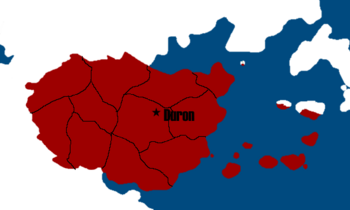Prybourne: Difference between revisions
No edit summary |
No edit summary |
||
| Line 11: | Line 11: | ||
|national_motto = ¡Que se rompan los martillos y se doblen las hoces!<br>Let the hammers break and the sickles fold! | |national_motto = ¡Que se rompan los martillos y se doblen las hoces!<br>Let the hammers break and the sickles fold! | ||
|national_anthem = [[Prybourne National Anthem]] | |national_anthem = [[Prybourne National Anthem]] | ||
|official_languages = | |official_languages =Common<br>Spanish | ||
|demonym = Prybournean | |demonym = Prybournean | ||
|ethnic_groups = | |ethnic_groups = | ||
Revision as of 13:15, 5 April 2024
This article is incomplete because it is pending further input from participants, or it is a work-in-progress by one author. Please comment on this article's talk page to share your input, comments and questions. Note: To contribute to this article, you may need to seek help from the author(s) of this page. |
Corporatocracia Democrática de Prybourne Democratic Corporatocracy of Prybourne | |
|---|---|
| Motto: ¡Que se rompan los martillos y se doblen las hoces! Let the hammers break and the sickles fold! | |
| Anthem: Prybourne National Anthem | |
 | |
| Capital and largest city | Opulencia |
| Official languages | Common Spanish |
| Demonym(s) | Prybournean |
| Government | Corporate Anocracy |
| Juliana de la Cruz | |
| Area | |
• Total | 475,442 km2 (183,569 sq mi) |
• Water (%) | 1.3 |
| Population | |
• 2013 estimate | 75,000,000 |
• 2013 census | 75,423,267 |
• Density | 39.7/km2 (102.8/sq mi) |
| GDP (PPP) | 2011 estimate |
• Total | $45 billion |
• Per capita | $2,257 |
| GDP (nominal) | 2011 estimate |
• Total | $25.759 billion |
• Per capita | $1,230 |
| Gini (2001) | 44.6 medium |
| HDI (2010) | very high (150th) |
| Currency | Pente (PNTE) |
| Time zone | UTC+1 (CST) |
• Summer (DST) | UTC+1 (not observed) |
| Driving side | right |
| Calling code | +201 |
| Internet TLD | .prb |
Prybourne, officially the The Corporatocracy of Prybourne (Prybournean: Corporatocracia de Prybourne) is a nation located on Anteria . Essentially a conglomerate overseen by a coalition of corporations and led by a Grand Nagus, Prybourne operates under the guiding principles of its national ideology, Capitology, which prioritizes profit-seeking and wealth accumulation. The nation faces environmental challenges, such as a persistent smog cloud resulting from industrial activities and the presence of industrial wastelands. As a member of the Canterian Federation, along with Kilowatt and Velnotia, Prybourne actively participates in the collaborative efforts and decision-making processes of the federation.
History
Government
The National Conglomerate of Prybourne is the defacto political power in Prybourne. As a Corporatocracy, the National Conglomerate is a conglomerate of multiple business entities that operate as the national government of Prybourne. This system allows for governance and private enterprise to work hand in hand to ensure the success and prosperity of the nation. The current leader of Prybourne is Juliana de la Cruz. She was voted into power by the five major corporations and holds the esteemed title of Grand Nagus, overseeing the conglomerate's operations and strategic direction. While conflicts and disputes among the corporations are not uncommon, often arising from personal motives or profit-driven objectives, there is a general consensus among them. The prevailing view is that cooperation and coordination are essential when pursuing significant opportunities, especially those that could lead to global economic influence. The Grand Nagus in Prybourne holds a central role, with the majority of decisions pertaining to the nation requiring her approval. Her authority is established through the Prybourne Bill of Opportunities, a key document outlining the nation's foundational principles and laws, and is supported Five Corporations that make up the "National Conglomerate".
In Prybourne, five major corporations hold considerable influence, operating largely independent of traditional government regulations. In the face of corporate dominance, the role of the national government in Prybourne has been significantly diminished to the point of dissolution leading to a shift in governance where corporate interests and policies hold sway over the socio-political landscape of Prybourne. It has, in fact, lead to the central government being rendered largely obsolete if there is one any more. The extensive influence and power wielded by the five major corporations have effectively supplanted traditional governmental functions and authority. With these corporations operating above government regulations, maintaining their own armed forces, overseeing privatized law enforcement, and claiming territories.

